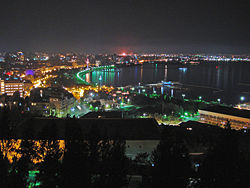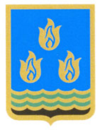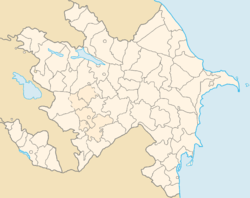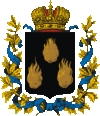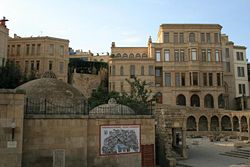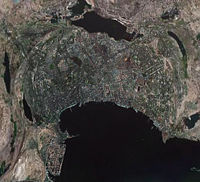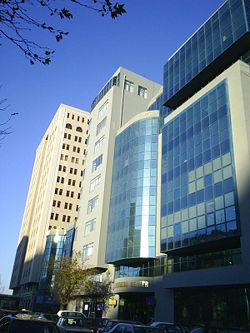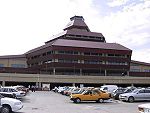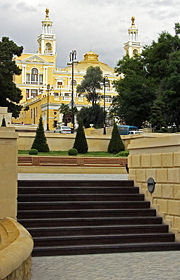Baku
2008/9 Schools Wikipedia Selection. Related subjects: Asia; Asian Cities
| Baku Bakı |
|||
|
|||
| Location in Azerbaijan | |||
| Coordinates: | |||
|---|---|---|---|
| Country | Azerbaijan | ||
| Government | |||
| - Mayor | Hajibala Abutalybov | ||
| Area | |||
| - Total | 260 km² (100.4 sq mi) | ||
| Elevation | -28 m (-92 ft) | ||
| Population (2005) | |||
| - Total | 2,036,000 | ||
| - Density | 7,830.76/km² (20,281.6/sq mi) | ||
| Time zone | AZT ( UTC+4) | ||
| - Summer ( DST) | AZT ( UTC+5) | ||
| Postal code | AZ1000 | ||
| Area code(s) | 12 | ||
| Website: BakuCity.az | |||
Baku ( Azerbaijani: Bakı), sometimes known as Baqy, Baky or Baki, is the capital, the largest city, and the largest port of Azerbaijan. Located on the southern shore of the Absheron Peninsula, the city consists of two principal parts: the downtown and the old Inner City (21,5 ha). As of January 1, 2005 the population was 2,036,000 of which 153,400 were internally displaced persons and 93,400 refugees. Baku is a member of Organization of World Heritage Cities and Sister Cities International. The city was also bidding for the 2016 Summer Olympics, but was eliminated June 4, 2008.
Baku is divided into eleven administrative districts, or raions (Azizbayov, Binagadi, Garadagh, Narimanov, Nasimi, Nizami, Sabail, Sabunchu, Khatai, Surakhany and Yasamal) and 48 townships. Among these are the townships on islands in the Baku Bay and the town of Oil Rocks built on stilts in the Caspian Sea, 60 km away from Baku. Was named world's dirtiest city by the Forbes magazine
Etymology
The name Baku is widely believed to be derived from the old Persian names of the city Bād-kube "باد کوبہ", meaning "Wind-pounded city", in which "Bād" means wind and "Kube" is rooted in the verb "Kubidan", to pound, thus referring to a place where wind is strong and pounding. Indeed, the city is renown for its fierce winter snow storms and harsh winds. It is also believed that Baku refers to Baghkuh, meaning "Mount of God". Baga (now Bagh) and Kaufa (now Kuh) are the Old Persian words for God and Mountain respectively; the name Baghkuh may be compared with Baghdād (God-given) in which dā is the Old Persian word for give. Arabic sources refer to the city as Baku, Bakukh, Bakuya, and Bakuye, all of which seem to come from a Persian name.
Various different hypotheses were also proposed to explain the etymology of the word "Baku". According L.G.Lopatinski and Ali Huseynzade "Baku" is derived from Turkic word for "hill". Specialist in the Caucasian history, K.P. Patkanov also explaines the name as "hill" but in Lak language.
The Turkish “Islamic Encyclopedia” presents the origin of the word “Baku” as being derived from the words “Bey-Kyoy” which mean “the main city” in Turkish.
History
The first written evidence for Baku is related to the 6th century AD.
| Walled City of Baku with the Shirvanshah's Palace and Maiden Tower* | |
|---|---|
| UNESCO World Heritage Site | |
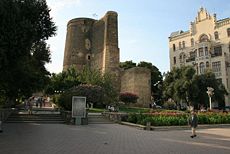 |
|
| Type | Cultural |
| Criteria | iv |
| Reference | 958 |
| Region** | Middle East |
| Inscription history | |
| Inscription | 2000 (24th Session) |
| Endangered | 2003- |
| * Name as inscribed on World Heritage List. ** Region as classified by UNESCO. |
|
The city became important after an earthquake destroyed Shamakhy and in the 12th century, ruling Shirvanshah Ahsitan I made Baku the new capital. In 1501, Safavid Shah Ismail I laid a siege on Baku. At this time the city was however enclosed with the lines of strong walls, which were washed by sea on one side and protected by a wide trench on land. In 1540 Baku was again captured by the Safavid troops. In 1604 the Baku fortress was destroyed by Iranian shah Abbas I.
On June 26, 1723, after a lasting siege using cannons, Baku surrendered to the Russians. According to Peter the Great's decree the soldiers of two regiments (2,382 people) were left in the Baku garrison under the command of Prince Baryatyanski, the commandant of the city. In 1795, Baku was invaded by Agha Muhammad Khan Qajar to defend against the tsarist Russia beginning a policy of subduing the South Caucasus to itself. In the spring of 1796 by Yekaterina II’s order General Zubov’s troops started a large campaign in Transcaucasia. Baku surrendered after the first demand of Zubov who had sent 6,000 militants to capture the city. On June 13, 1796 the Russian flotilla entered the Baku bay and a garrison of the Russian troops was placed in the city. General Pavel Tsitsianov was appointed the Baku's commandant. Later, however, Czar Pavel I ordered him to cease the campaign and withdraw the Russian forces. In March, 1797 the tsarist troops left Baku but a new tsar, Alexander I began to show a special interest in capturing Baku. In 1803, Tsitsianov reached an agreement with the Baku khan to compromise, but the agreement was soon annulled. On February 8, 1806, upon the surrendering of Baku, Huseyngulu khan of Baku stabbed and killed Tsitsianov at the gates of the city.
In 1813 , Russia signed the Treaty of Gulistan with Persia, which provided for the cession of Baku and most of the Caucasus from Iran and their annexation by Russia.
Oil boom
The first oil well was drilled in Bibi-Heybat suburb of Baku in 1846. But the large-scale oil development started in 1872, when the Russian imperial authorities auctioned the parcels of oil-rich land around Baku to private investors. Within a short period of time Swiss, British, French, Belgian, German, Swedish and American investors appeared in Baku, among them were the firms of the Nobel brothers and Rothschilds, and industrial oil belt, better known as Black City, was established near Baku. By the beginning of the 20th century almost half of the oil reserves in the world had been extracted in Baku.
In 1917, after the October revolution, in the turmoil of the ongoing World War I and breakup of Russian Empire, Baku came under the control of Baku Commune led by a veteran Bolshevik, Stepan Shaumyan. Seeking to capitalize on the existing inter-ethnic conflicts, by spring 1918, Bolsheviks inspired and condoned a civil warfare in and around Baku. During the infamous March Days, using the support of the Dashnak Armenian militia in the city, and under the pretext of suppressing Musavat party, Bolsheviks attacked and massacred thousands of Azeris and other Muslims in Baku .
On May 28, 1918 the Azerbaijani fraction of the Transcaucasian Sejm proclaimed the independent Azerbaijan Democratic Republic (ADR) in Ganja. Shortly after, Azerbaijani forces, with support of the Ottoman Army of Islam led by Nuru Pasha, started their advance onto Baku, eventually capturing the city from the loose coalition of Bolsheviks, Esers, Dashnaks, Mensheviks and the British forces under the command of General Dunsterville on September 15, 1918. Thousands of Armenians in the city were massacred in revenge for the earlier March Days . Baku became the capital of ADR, and two years later - when on April 28, 1920, the 11th Red Army invaded Baku and reinstalled the Bolshevik power - the capital of Azerbaijan SSR.
Historical city core
The centre of Baku is the old town, which is also a fortress. In December 2000, the Inner City of Baku with the Palace of the Shirvanshahs and Maiden Tower became the first location in Azerbaijan classified as a World Heritage Site by UNESCO.
Most of the walls and towers, strengthened after the Russian conquest in 1806, survived. This section is picturesque, with its maze of narrow alleys and ancient buildings: the cobbled streets past the Palace of the Shirvanshahs, two caravansaries (ancient inns), the Maiden Tower (nice view of the harbour), the baths and the Juma Mosque (it used to house the Carpet and Applied Arts Museum, but now is a mosque again; the carpets got moved to the former Lenin museum). The old town also has dozens of small mosques, often without any particular sign to distinguish them from the next building.
In 2003 , UNESCO placed the Inner City on the List of World Heritage in Danger, citing damage from a November 2000 earthquake, poor conservation as well as "dubious" restoration efforts . The Martyrs' Lane, formerly the Kirov Park, is dedicated to the memory of those who lost their lives during the Nagorno-Karabakh War and also to the 137 people who were killed on Black January, 1990.
Climate
During Soviet times, Baku was a vacation destination where citizens could enjoy beaches or relax in now-dilapidated spa complexes overlooking the Caspian Sea. The climate is hot and humid in the summer, and cool and wet in the winter. During the winter gale-force winds sweep through on occasion, driven by masses of polar air (strong northern winds Khazri and southern Gilavar are typical here); however, snow is rare at 28 m below sea level, and temperatures on the coast rarely drop to freezing. The average annual temperature of Baku and that of the Earth differ by less than 0.1 °C (14.2 °C). The southwestern part of Great Baku is a more arid part of Azerbaijan (precipitation here is less than 150 mm a year). In the vicinities of the city there are a number of mud volcanoes (Keyraki, Bogkh-bogkha, Lokbatan and others) and salt lakes (Boyukshor, Khodasan etc.).
| Weather averages for Baku | |||||||||||||
|---|---|---|---|---|---|---|---|---|---|---|---|---|---|
| Month | Jan | Feb | Mar | Apr | May | Jun | Jul | Aug | Sep | Oct | Nov | Dec | |
| Average high °C (°F) | 6 (43) | 6 (43) | 9 (48) | 16 (61) | 22 (72) | 27 (81) | 31 (88) | 29 (84) | 26 (79) | 19 (66) | 13 (55) | 9 (48) | |
| Average low °C (°F) | 2 (36) | 2 (36) | 4 (39) | 9 (48) | 14 (57) | 19 (66) | 22 (72) | 23 (73) | 19 (66) | 13 (55) | 8 (46) | 4 (39) | |
| Precipitation mm (inches) | 20 (0.79) | 20 (0.79) | 20 (0.79) | 17 (0.67) | 17 (0.67) | 7 (0.28) | 2 (0.08) | 5 (0.2) | 15 (0.59) | 25 (0.98) | 30 (1.18) | 25 (0.98) | |
| Source: Weather.com 2008 | |||||||||||||
Demographics
Until 1988 Baku had very large Armenian, Russian, and Jewish population that contributed to cultural diversity and added in various ways (music, literature, architecture) to Baku's history treasure chest. Under Communism, the Soviets took over the majority of Jewish property in Baku and Kuba. Since the collapse of the Soviet Union, Azerbaijani President Heydar Aliev has returned several synagogues and a Jewish college nationalized by the Soviets, to the Jewish community. He has encouraged the restoration of these buildings and is well-liked by the Jews of Azerbaijan. Renovation has begun on seven of the original eleven synagogues, including the Gilah synagogue, built in 1896, and the large Kruei Synagogue.. The new Azerbaijan constitution grants religious freedom and asserts that there is no state religion.
Currently vast majority of the population of Baku are ethnic Azerbaijanis (more than 90%). The intensive growth of the population started in the middle of the 19th century when Baku was a small town with the population of about 7 thousand people all in all. The population increased again from about 13,000 in the 1860s to 112,000 in 1897 and 215,000 in 1913, making Baku the largest city in the Caucasus region.
Baku has been a cosmopolitan city at certain times during its history, meaning ethnic Azerbaijanis did not constitute the majority of population.
| Year | Armenians | Azerbaijanis | Georgians | Iranian Citizens | Jews | Russians | Total |
|---|---|---|---|---|---|---|---|
| 1897 | 19,060 | 40,148 | 971 | 9,426 | 2,341 | 37,399 | 111,904 |
| 1903 | 26,151 | 44,257 | N/A | 11,132 | N/A | 56,955 | 155,876 |
| 1913 | 41,680 | 45,962 | 4,073 | 25,096 | 9,690 | 76,288 | 214,672 |
Religion
More than 94% of the residents of Baku practice various forms of Islam (vast majority Shia). A small minority of the population (about 4%) are Christians (majority Russian Orthodox Church, Georgian Orthodox Church and Molokans). Baku also has three different Jewish communities, namely the Ashkenazim Jews, the Mountain Jews, and the Georgian Jews.
Economy
The basis of Baku's economy is petroleum. The existence of petroleum has been known since the 8th century. In the 10th century, the Arabian traveler, Marudee, reported that both white and black oil were being extracted naturally from Baku . By the 15th century oil for lamps was obtained from hand dug surface wells. Commercial exploitation began in 1872 , and by the beginning of the 20th century the Baku oil fields were the largest in the world. Towards the end of the 20th century much of the onshore petroleum had been exhausted, and drilling had extended into the sea offshore. By the end of the 19th century skilled workers and specialists flocked to Baku. By 1900 the city had more than 3,000 oil wells of which 2,000 of them were producing oil at industrial levels. Baku ranked as one of the largest centres for the production of oil industry equipment before WWII. The World War II Battle of Stalingrad was fought to determine who would have control of the Baku oil fields. Fifty years before the battle, Baku produced half of the world's oil supply: Azerbaijan and the United States are the only two countries ever to have been the world's majority oil producer. Currently the oil economy of Baku is undergoing a resurgence, with the development of the massive Azeri-Chirag-Guneshli field (Shallow water Gunashli by SOCAR, deeper areas by a consortium lead by BP), development of the Shah Deniz gas field, the expansion of the Sangachal Terminal and the construction of the BTC Pipeline. The old Inturist Hotel was one of Baku's largest, now being renovated, but overshadowed by the newer Hyatt Park, Hyatt Regency, Park Inn and Excelsior.
Baku Stock Exchange has been operating since February 2001.
Infrastructure
Bulk power supply of Baku is provided by five 110 kV lines. As of February 8, 2008 three of them (total length 23,6 km) have been completely refitted and modernized with their carrying capacity being doubled. Three 110 kV and twelve 35 kV substations were commissioned recently. Water supply is secured by several lines, the purest water comes from Khachmaz and Shollar lines.
Transport and communication
Baku is served by the Heydar Aliyev International Airportand the Baku Metro. There were once also trams. There are two official taxi companies in the city: the yellow Star cabs and the white taxis with blue sign from "Azerq Taxis". The van buses stop at any point along that route when flagged down or told to stop. Shipping services operate regularly from Baku across the Caspian Sea to Turkmenbashi (formerly Krasnovodsk) in Turkmenistan and to Bandar Anzali and Bandar Nowshar in Iran. The city's main Internet providers are ADaNet and AzInternet Services.
Education
As Azerbaijan's centre of education, Baku boasts many universities and vocational schools. After Azerbaijan gained independence, the fall of Communism led to development of a number of private institutions. Baku also houses the Academy of Sciences of Azerbaijan founded here in 1945 .
Public universities
- Azerbaijan Medical University (founded 1930)
- Azerbaijan State Economic University (1930)
- Azerbaijan State Oil Academy (1920)
- Azerbaijan Technical University (1950)
- Azerbaijan University of Languages (1973)
- Azerbaijan Architecture and Construction University (1975)
- Baku Academy of Music (1920)
- Baku Slavic University (1946)
- Baku State University (1919)
Private universities
- Azerbaijan International University (1997)
- Khazar University (1991)
- Odlar Yurdu University (1995)
- Qafqaz University (1992)
- Western University (1991)
Entertainment
Baku has a vibrant life regarding theatre, opera and ballet, drawing both from the rich local dramatic portfolio and from the international repertoire. The main movie theatre is "Azerbaijan Cinema". The Azerbaijan State Academic Opera and Ballet Theatre, designed by architect N. G. Bayev, is one of the most ornate music halls in the city. The State Philharmonic Hall with excellent acoustic conditions often holds performances outside, in a pleasant park. The Carpet and Applied Arts Museum exhibits the carpets from all periods, styles and from both Azerbaijan proper and the Azeri provinces in Iran. Baku also houses country's biggest art museum - Azerbaijan State Museum of Art, a depository of both domestic and foreign works of art, Western and Eastern.
Heydar Aliyev Palace is one of the main venues featuring sizeable performances (e.g. that of Coolio), though it is currently closed for a major refurbishment. Some of the most popular discotheques and night clubs include, "X-Site", "Capitol Night Club", "Le Chevalier" at Europa Hotel, " Zagulba Disco Club" and "Le Mirage". Most of them are open till the early hours of the morning. The "Capitol Night Club" is a lively night spot with gay elements, playing a blend of local, Russian and Western music, R&B, trance, europop and techno.
Most of the pubs and bars are located near Fountain Square and are usually open until the early hours of the morning. There are several British and Irish style pubs, among them "Corner Bar", "Shakespeares", "Finnigans" the "Rig Bar", "O'Malley's" and the "Phoenix Bar". There is also a Jazz Club. The Baku International Jazz Festival is organized annually.
Notable beaches include Shikhovo and "One Thousand and One Nights".
Sister cities
 Amman, Jordan
Amman, Jordan Basra, Iraq
Basra, Iraq Bordeaux, France
Bordeaux, France Dakar, Senegal
Dakar, Senegal Honolulu, USA
Honolulu, USA Houston, USA
Houston, USA Istanbul, Turkey
Istanbul, Turkey Izmir, Turkey
Izmir, Turkey Jeddah, Saudi Arabia
Jeddah, Saudi Arabia Kiev, Ukraine
Kiev, Ukraine Mainz, Germany
Mainz, Germany Naples, Italy
Naples, Italy Saint-Petersburg, Russia
Saint-Petersburg, Russia Sarajevo, Bosnia and Herzegovina
Sarajevo, Bosnia and Herzegovina Tabriz, Iran
Tabriz, Iran Vung Tau, Vietnam
Vung Tau, Vietnam
Partnership relations at different levels were established with Berlin, Paris, Aberdeen, Vienna, Stavanger, Tbilisi, Astana, Minsk, Moscow, Volgograd, Tashkent, Stambul and Chengdu.
Famous people from Baku
Because of intermittent periods of great prosperity and as the largest city in the Caucasus and one of the most ethnically and culturally diverse in the Soviet Union, Baku prides itself on having produced a disproportionate number of notable figures in the sciences, arts and other fields. Some of the houses they resided in display commemorative plaques.
Science
- Abbasgulu Bakikhanov, philosopher
- Kerim Kerimov, one of the founders and head of Soviet space program for 25 years
- Lev Landau, physicist, winner of the Nobel Prize in Physics of 1962
- Lotfi Zadeh, inventor of fuzzy logic
- Max Black, philosopher
Music
- Bul-Bul, singer.
- Polad Bul-Bul oglu, singer.
- Fikret Amirov, composer.
- Alexey Ekimyan, composer and police general.
- Artemi Ayvazyan, composer and conductor.
- Gara Garayev, composer.
- Uzeyir Hajibeyov, composer.
- Muslim Magomayev, famous opera and pop singer.
- Vagif Mustafazadeh, iconic Soviet jazz pianist, composer.
- Alim Qasimov, Mugham singer (a nearby village).
- Mstislav Rostropovich, cellist.
- Lutviyar Imanov,famous opera singer.
- Larisa Dolina, Russian pop singer
Literature and Arts
- Sattar Bahlulzade, painter
- Huseyn Javid, poet and playwright
- Mikayil Mushfig, poet
- Lev Nussimbaum, writer, author of the best-selling novel "Ali and Nino"
- Tahir Salahov, painter and draughtsman
Chess
- Garri Kasparov, grandmaster and world champion
- Elmar Magerramov, grandmaster
- Teimour Radjabov, grandmaster
- Emil Sutovsky, grandmaster
- Tatiana Zatulovskaya, grandmaster
Entertainment
- Rasim Ismaylov, film director and writer
- Rustam Ibrahimbeyov, screenwriter and Academy Award winner
- Magsud Ibrahimbeyov, writer
- Murad Ibrahimbeyov, film director
- Abbas Sharifzadeh, actor and director
- Vladimir Menshov, Academy Award winning film producer.
- Sergo Zakariadze, actor
- Henry David, actor
Business
- Vagit Alekperov, founder of the leading Russian oil company LUKOIL
- Murtuza Mukhtarov, oil industrialist and millionaire
- Musa Nagiyev, industrial magnate in late 19th - early 20th century
- Zeynalabdin Taghiyev, industrial magnate and philanthropist
Politics
- Khalilullah I, (1417-1465), ruler of Shirvan
- Mammed Amin Rasulzade, politician, founding father of Azerbaijan Democratic Republic
- Georgy Shakhnazarov, Soviet political scientist
- Alimardan Topchubashev, politician, foreign minister of Azerbaijan Democratic Republic
Military
- Ziya Bunyadov, Hero of the Soviet Union and Academician
- Mehdi Huseynzade, Hero of the Soviet Union
- Rafael Kapreliants (Gabrielyan), Hero of the Soviet Union
- Musa Manarov, cosmonaut
- Samedbey Mehmandarov, Russian tsarist general, Minister of Defense of Azerbaijan Democratic Republic
- Ali-Agha Shikhlinski, Russian tsarist lieutenant-general, Deputy Minister of Defense of Azerbaijan Democratic Republic
- Richard Sorge, famous Soviet spy
